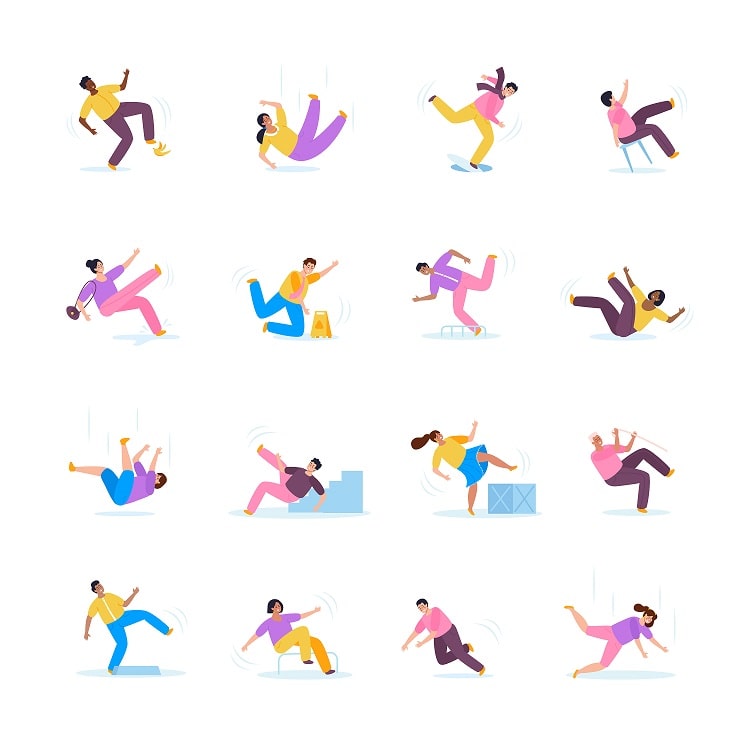Slip and fall accidents are a widespread occurrence. These accidents can lead to various injuries, starting from minor bruises to head trauma. Negligence of others in their duties is a leading cause of these accidents.
If you have had a slip and fall accident caused by someone else, you may be able to claim compensation in a court of law. It is important to understand the types of accidents and the compensation awarded for different injuries.
Understanding Slip and Fall Accidents
Slip and fall accidents refer to accidents which occur when someone slips, causing an injury. Neglect on the part of business owners, councils and landlords on their housekeeping duties makes some areas accident-prone.
Various reasons can lead to slip and fall accidents, like spills, uneven pavements, and unmet safety standards. These reasons can be directly related to neglect of duty of care. The injured can demand compensation for the mental, physical, and financial damage caused by the accident.
Legal Framework in the UK for Slip and Fall Claims
A slip and fall accident that causes any injury or damages may lead to a compensation case if the following conditions are met:
- The defendant involved has a duty of care to the claimant.
- Duty of care was breached, which led to the accident.
- The injuries can be directly tied to the accident.
Duty of care refers to the commitment of business owners, councils and landlords to provide a safe environment for others. If a person enters a shop and slips on a spill, that is a breach of duty of care on the business owner’s part.
Standard Time Limit
The standard time limit for most personal injury claims in the UK, including slip and fall cases, is three years. This means you have three years from the accident date to start legal proceedings. The start date is typically the day the accident occurred or when you first became aware of your injury.
Exceptions to the Rule
- If the slip and fall accident victim is a minor (under 18 years old), the three-year limitation period does not start until their 18th birthday. This gives them until their 21st birthday to make a claim.
- For individuals who lack the mental capacity to make a claim, the three-year limit is suspended until their capacity is regained. If this capacity is never regained, there might be no time limit to make a claim.
How is Compensation Calculated for Pain and Suffering?
The severity of the injury and its impact on the victim’s life determines the payout amount from the claim. This calculation considers bills, emotional damages, and loss of earnings because of the accident. The following table showcases a general range of payouts that can be expected for various injuries from slip and fall accidents.

Average Payout for Slip and Fall in the UK
The average payout for slip and fall in the UK can vary significantly based on the severity of the injury. Victims need to understand the potential payout ranges, keeping in mind that each case is unique.
Minor Injuries
For minor injuries, which often include bruises, minor cuts, or sprains, the compensation typically ranges from a few hundred to a few thousand pounds. These injuries usually require minimal medical treatment and have a swift and full recovery.
- £1,000 – £3,000
Moderate Injuries
Moderate injuries include more severe sprains, minor fractures, or injuries. These require some medical intervention but don’t cause any permanent damage.
- £3,000 – £10,000
Serious Injuries
Serious injuries in slip and fall cases can include broken bones, significant head or back injuries, or injuries that result in chronic pain or long-term health issues.
- £10,000 – £30,000
Severe and Life-Altering Injuries
At the highest end of the spectrum are severe and life-altering injuries. These can include severe head trauma, spinal cord injuries, or other injuries that lead to permanent disability, chronic pain, or significant lifestyle changes.
- £30,000 – £250,000 or more
The Slip and Fall Claims Process
You can contact solicitors who are experts in this field. These solicitors usually operate on a no-win, no-fee policy, meaning they will charge a fee only if their claimant wins the case; otherwise, they will work for free.
The first step in the process is to collect evidence. You’ll need to convince the court and the defendant’s insurance company that the accident was solely caused by the defendant’s neglect and breach of duty of care.
This evidence can include but is not limited to photographs, videos of the accident scene, eyewitness testimonies, detailed medical bills and records, expert opinions on the incident and injuries, official accident reports, personal journals documenting the injury’s impact, and receipts for any related expenses. The average payout for slip and fall in the UK encourages the affected to act against the negligent party that has caused the action by breaching the duty of care. Evidence should be gathered thoroughly, and legal counsel should be sought immediately to build a strong case.
